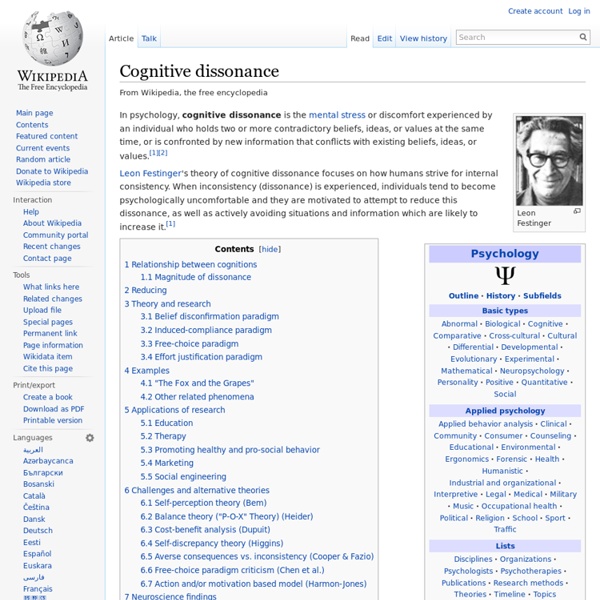Cognitive Dissonance
Explanations > Theories > Cognitive Dissonance Description | Research | Example | So What? | See also | References Description This is the feeling of uncomfortable tension which comes from holding two conflicting thoughts in the mind at the same time.
China
If we explore the Chinese culture through the lens of the 6-D Model, we can get a good overview of the deep drivers of Chinese culture relative to other world cultures. Power distanceThis dimension deals with the fact that all individuals in societies are not equal – it expresses the attitude of the culture towards these inequalities amongst us. Power distance is defined as the extent to which the less powerful members of institutions and organisations within a country expect and accept that power is distributed unequally.
Georg Wilhelm Friedrich Hegel - Philosopher
The birthplace of Hegel in Stuttgart, which now houses The Hegel Museum Georg Wilhelm Friedrich Hegel (German: [ˈɡeɔɐ̯k ˈvɪlhɛlm ˈfʁiːdʁɪç ˈheːɡəl]; August 27, 1770 – November 14, 1831) was a German philosopher, and a major figure in German Idealism. His historicist and idealist account of reality revolutionized European philosophy and was an important precursor to Continental philosophy and Marxism. Life[edit] Early years[edit] Childhood[edit]
BUILDING LIVING NEIGHBORHOODS
If you are one of a group of friends who are talking about building a new place to live a better life, this website can show you ways of working that are inspiring and related to the things which matter in your lives. The ACTION & PRACTICE pages will guide you. If you are a developer or landowner, this website can show you ways of working that are more capable of creating healthy, hospitable and beautiful places for people to live, than present forms of practice typically allow.
Cognitive Dissonance and learning
Cognitive dissonance is a psychological phenomenon which refers to the discomfort felt at a discrepancy between what you already know or believe, and new information or interpretation. It therefore occurs when there is a need to accommodate new ideas, and it may be necessary for it to develop so that we become "open" to them. Neighbour (1992) makes the generation of appropriate dissonance into a major feature of tutorial (and other) teaching: he shows how to drive this kind of intellectual wedge between learners' current beliefs and "reality". Beyond this benign if uncomfortable aspect, however, dissonance can go "over the top", leading to two interesting side-effects for learning:
Cultural Detective Series Content/Packages
Cultural Detective® helps you increase productivity, effectiveness, employee satisfaction and profits by building loyalty, teamwork and return on investment. Subscribe to Cultural Detective Online for immediate access to the most robust, process-based, interactive, theoretically-grounded global effectiveness tools available for achieving the results that intercultural competence can bring to your organization. Alternatively the Cultural Detective materials can be licensed as PDFs. Click here to learn what is included in a PDF package. Contact us to inquire about quanitities of 100 or more. Use Cultural Detective to enhance your personal performance, in executive coaching, staff or team meetings to build team competence, in lunch and learns, webinars, and face-to-face learning events.
'The Phenomenology of Spirit'
Phänomenologie des Geistes (1807) is Georg Wilhelm Friedrich Hegel's most important and widely discussed philosophical work. Hegel's first book, it describes the three-stage dialectical life of Spirit. The title can be translated as either The Phenomenology of Spirit or The Phenomenology of Mind, because the German word Geist has both meanings.
Stockholm syndrome
Stockholm syndrome, or capture-bonding, is a psychological phenomenon in which hostages express empathy and sympathy and have positive feelings toward their captors, sometimes to the point of defending and identifying with the captors. These feelings are generally considered irrational in light of the danger or risk endured by the victims, who essentially mistake a lack of abuse from their captors for an act of kindness.[1][2] The FBI's Hostage Barricade Database System shows that roughly 8 percent of victims show evidence of Stockholm syndrome.[3] Stockholm syndrome can be seen as a form of traumatic bonding, which does not necessarily require a hostage scenario, but which describes "strong emotional ties that develop between two persons where one person intermittently harasses, beats, threatens, abuses, or intimidates the other.
UK plc must do its bit for broken Britain
Britain has a rubbish infrastructure. The road network gets clogged up and the rail network is a relic of the 19th century. We know this because business bangs on incessantly about the money it is losing through congestion and delay. UK plc is not up to the job, it says.



